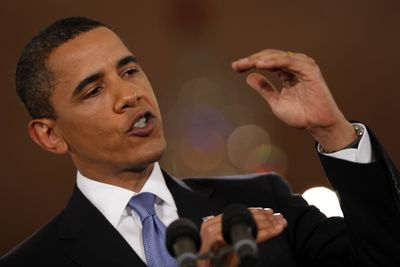Obama warns more tests ahead for nation
Crises piling up, improvement won’t be quick, he says

WASHINGTON – A somber President Barack Obama, marking the end of his first three months in office, warned a recession-weary nation Wednesday that its patience and resilience will be tested even more in the second 100 days – grappling as it is with an array of simultaneous crises with few if any precedents.
Piled atop the continuing economic woes, the soaring federal debt and Washington’s deepening entanglement in some of the country’s biggest private companies, Obama said, the government faces a potentially dangerous flu epidemic, divisive questions about the use of torture to combat terrorism and the Taliban’s growing threat to a weak but nuclear-armed government in Pakistan.
Obama said “the typical president, I think, has two or three big problems,” in a prime-time appearance in the East Room of the White House. “We’ve got seven or eight big problems. And so we’ve had to move very quickly.”
Underscoring the severity of the problems on the domestic front, Wednesday began with a sober reminder of the recession’s depth: The U.S. economy shrank at a rate of 6.1 percent in the first quarter that ended last month.
Given so many serious problems demanding such urgent action, he said, improvement would not be immediate.
“The ship of state is an ocean liner, it’s not a speed boat,” the president said. “If we can move this big battleship a few degrees in a different direction, we may not see all the consequences of that change a week from now or three months from now, but 10 years from now, or 20 years from now.”
While much of Obama’s news conference focused on domestic problems and politics, some of the president’s most sobering comments involved Pakistan, the rising internal threat posed by the Taliban and the challenge of keeping Islamabad’s nuclear weapons secure.
Describing the Pakistani regime as “extremely fragile,” Obama said military leaders and government officials were only belatedly recognizing that its half-century-long obsession with India had blinded it to the more immediate threat posed by the Taliban.
This week the Pakistan military began a significant counterattack against the Taliban, which has moved within 60 miles of Islamabad in recent weeks.
Although other U.S. officials have been critical of the Pakistani government in the past, Obama went further. Most critiques have focused on Islamabad’s failure to provide services in their border areas or combat insurgents. Obama’s criticism was sharper, and he pointed to failures that extended throughout the country.
The Pakistani government’s hold on power was weak, he said, because it could not provide basic services to its people, including education, health care and a widely accepted system of law and judicial administration.
“And so as a consequence, it is very difficult for them to gain the support and the loyalty of their people,” Obama said.
Nonetheless, the president expressed confidence that Islamabad’s nuclear weapons would not fall into Taliban or terrorist hands.
“I’m confident that we can make sure that Pakistan’s nuclear arsenal is secure,” he said, “because the Pakistani army, I think, recognizes the hazards of those weapons falling into the wrong hands.”